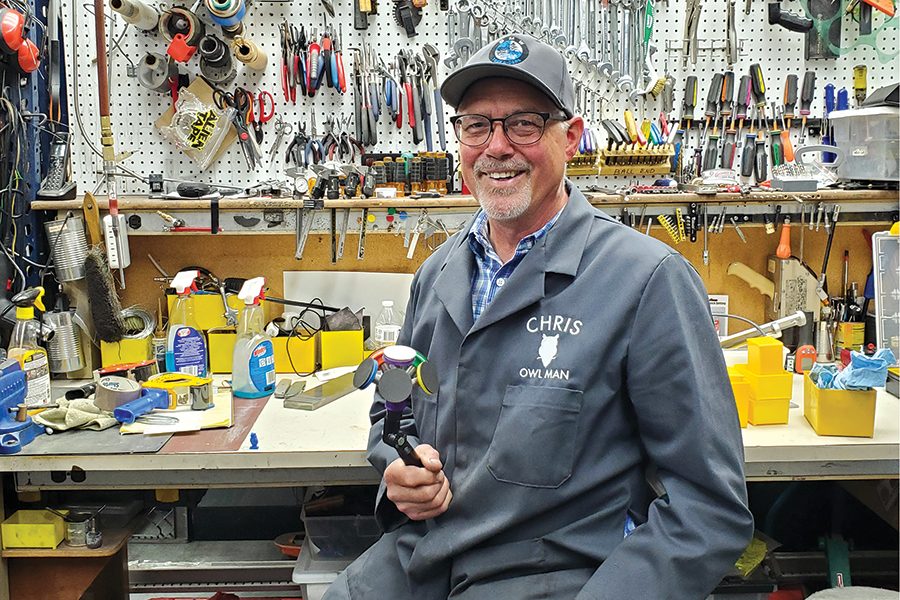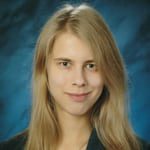
Home » Local inventor seeks to sell business focused on designing, manufacturing and engineering solutions
Local inventor seeks to sell business focused on designing, manufacturing and engineering solutions

June 13, 2023
For over 20 years, the shop at 1854 Bronco Lane near the Richland Airport has been the creative lair of local inventor Chris Smith, owner of Intellegration LLC.
The business’ name marries the words “intelligent” and “integration,” which Smith said is short for “integrating intelligent ideas.” It launched in 2003.
The name’s fitting since Smith’s career has focused on designing and manufacturing specialized tools and engineering solutions to suit unique applications and solve complex issues across multiple fields: food processing, medicine, robotics, aerospace, metal refining and the nuclear sector.
Now, the 67-year-old is ready to semi-retire and wants to sell Intellegration, along with some of his inventions key to the nuclear industry. His asking price is $400,000.
Key inventions
Smith has provided his services to many prominent local businesses.
He’s known for his contributions to U.S. Department of Energy projects, many of which have come in the form of long-reach tools featuring an assortment of attachments.
These inventions have enabled those working in proximity to radiation to maintain greater distance and enable workers to retrieve underwater radioactive slugs and to swab and sample uneven, multidimensional surfaces.
He took some of these tools to Japan in 2014 to help with the cleanup of the Fukushima reactor meltdown.
“My spiral logo came from one of the radiation protection devices I designed,” Smith said.
Smith also designed the signature intermedullary nail SIGN Fracture Care International uses to help mend broken bones. The Richland-based nonprofit gives the injured poor access to fracture surgery by donating orthopedic education and implant systems to surgeons in developing countries.
“It was really meaningful to be part of (that) legacy … Patients are up and walking the next day, the nail provides complete support for the body’s weight,” Smith said. “There are more SIGN nails used in patients than all other prosthetics put together in the world.”
He also owns a patent on a “prehensile apparatus” he built while working at Battelle – a robotic hand which, when pressure is applied to the palm, curls around an object.
At Lamb Weston, he undertook some “fun” efficiency-enhancing projects involving various potato slicing and dicing machines.
In addition to the satisfaction derived from landing on winning solutions, he said the best part of the gig was that Friday was always “Fry Day,” which meant taste-testing products.
He uses both traditional fabrication techniques and SolidWorks 3D solid modeling software to create scale models of recommended alterations to existing systems as well as fabricating parts out of a variety of materials.
Other career highlights have included a robotic conveyor system for transporting radioactive seeds for prostate cancer treatment, a remote-controlled trolley for moving large airplane wings into machining centers, a UV water disinfection system with multiple power sources, medical scroll pump for CPAP sleep apnea machine development, and a robotic high-pressure water spray cleaning system for hazardous environments.
Smith said he sees himself as a “systems thinker.” No matter what the project, his bottom line is a simple one: “It has to work, and it has to work effectively and safely.”
Outside the box
Smith’s thinking has always been a bit outside the box.
He was exposed to a variety of machines and tools while working in his dad’s electric motor shop and accompanying him on repair calls.
After graduating from Wenatchee High School in 1975, he headed off to college at Boise State University. To provide for himself, he walked into a motor shop at 19 years old and declared himself a journeyman motor winder. The crew scoffed at him, but after demonstrating his knowledge and capabilities, they took him on.
While at school, he met his wife of 44 years, Nancy, who taught English and journalism classes at Hanford High School for 25 years. They married in 1979 and he completed his mechanical engineering degree at Letourneau College in Texas in 1981.
His first post-college job was in Dallas.
“I worked in the aerospace industry creating robots to do some of the fabrication processes for making abradable air seals for engines,” he said.
“After seven years down in Dallas, Hanford was my ticket back to the Northwest,” Smith said.
He stayed only a few years working for UNC at the 100 K Area before moving to Corvallis to pursue a job at Intellidex in robotics systems. That lasted a year before the company closed down, and then he was back in Richland working for Vista Engineering Technologies, now Veolia Nuclear Solutions.
“Phil Ohl (president and CEO) was an amazing mentor and helped me get Intellegration started,” Smith recalled.
Looking back over his career, which has encompassed an era of significant technological advancement that laid the foundation for the advancements being made today, Smith said he is most interested in seeing what robotics and artificial intelligence will be able to accomplish in terms of new age manufacturing techniques.
“My prediction is that the next generation of 3D printers will be more of a robotic articulation as opposed to Cartesian,” he said. The latter uses a pattern of code to make each layer of a 3D-printed object.
“Future printers will have a full-on multi-axis processor that will use AI to build objects.”
What’s next?
Though they’ve sold their home, bought a new one in Silverton, Oregon, closer to their son and daughter-in-law, and operations are winding down, Smith said he’s still wrapping up a couple of projects at Intellegration.
One involves another cutting-edge cancer treatment that will inject a radioactive gel inside tumors to kill the cancer from the inside out. The other is an expansion on the previous prostate cancer treatment he helped engineer the delivery mechanism for.
Though he’ll be closing the books on Intellegration, Smith said he plans to still do some consulting and take on a project or two as proposals suit him.
And he’ll still be 3D printing his trademark owl figures that have become a sort of calling card for the inventor. He’s been nicknamed “Owl Man” by friends and family.
He said he looks forward to spending more time with his family, riding with the BMW Riders of Oregon, chipping away at visiting all of the U.S. National Parks with Nancy, and volunteering. He’s been a member of Richland Rotary Club for a decade and worked on Habitat for Humanity projects.
Though Smith said he might end up packing up the bulk of the shop to take with him, he’s open to offers to buy the business and its full lineup of equipment including lathe, mill, welders, grinders, raw metal and mechanical hardware on hand for quick prototype fabrication.
“It would be great if the legacy of Intellegration and the product line could continue beyond me,” he said.
His entreaty to prospective buyers: “If reading this story puts a spark in your mind … If you have an inkling, reach out to me at 509-539-1877.”
Local News Manufacturing
KEYWORDS june 2023




